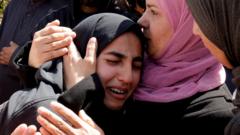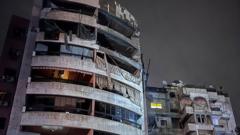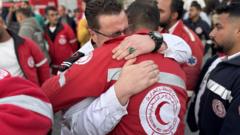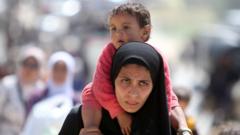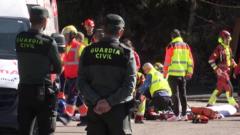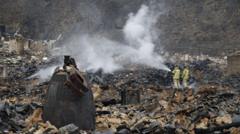Dr. Mark Perlmutter describes traumatic injuries and shortages of medical supplies as casualties rise from renewed Israeli military operations.
**Gaza: Medical Crisis Deepens as Wounded Palestinians Face Dire Conditions**
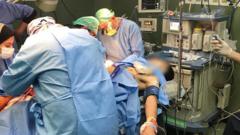
**Gaza: Medical Crisis Deepens as Wounded Palestinians Face Dire Conditions**
A US surgeon highlights the urgent need for humanitarian assistance amid escalating violence in Gaza.
Dr. Mark Perlmutter, an American surgeon who has been providing medical assistance in Gaza over the past three weeks, has raised alarm about the escalating humanitarian crisis as wounded Palestinians succumb to preventable deaths due to severe shortages of essential medical supplies. Operating in two hospitals, Dr. Perlmutter recounts harrowing experiences of young patients, including a 15-year-old girl critically injured by Israeli gunfire while riding her bicycle. He reported that medical teams are forced to operate without basic necessities like soap, antibiotics, and proper imaging facilities as Israeli military operations against Hamas intensify.
The Israeli government claims these renewed attacks are aimed at compelling Hamas to release hostages, but Dr. Perlmutter criticizes the situation as unacceptable, suggesting it amounts to genocide. During his recent stay in Gaza, he worked at Al-Aqsa Hospital in Deir al-Balah and Nasser Hospital in the south, where he witnessed firsthand the devastating impact on civilian lives and the medical professionals striving to manage overwhelming trauma cases with dwindling resources.
Dr. Perlmutter highlighted particularly tragic cases, such as two 15-year-olds severely injured by airstrikes. He described the story of a young boy whose car was attacked after receiving evacuation warnings. The boy suffered horrific injuries, with his grandmother killed and his own injuries necessitating multiple surgeries for survival.
In the face of these challenges, Dr. Perlmutter spoke highly of the resilience and dedication of Palestinian medical staff, contrasting their commitment with his own temporary presence in the region. He noted that local medical personnel continue to volunteer their time amidst extreme stress, often without pay, returning to dire living conditions after their shifts.
Critical medical facilities across Gaza have been overwhelmed and ill-equipped to handle the influx of casualties resulting from renewed hostilities, exacerbated by Israel's closure of border crossings on March 2, which halted humanitarian aid. The United Nations has termed the humanitarian situation in Gaza "dire," with vital supplies rotting at border points while medical facilities struggle to function.
Dr. Perlmutter emphasized the urgent need for international intervention to uphold humanitarian law and provide necessary aid to Gaza’s beleaguered population. With reports indicating that over 15,000 Palestinian children have been killed in recent conflicts, he warned that without a significant increase in medical resources, the death toll will continue to rise, with many lives lost due to injuries that could have otherwise been treated.
The Israeli government claims these renewed attacks are aimed at compelling Hamas to release hostages, but Dr. Perlmutter criticizes the situation as unacceptable, suggesting it amounts to genocide. During his recent stay in Gaza, he worked at Al-Aqsa Hospital in Deir al-Balah and Nasser Hospital in the south, where he witnessed firsthand the devastating impact on civilian lives and the medical professionals striving to manage overwhelming trauma cases with dwindling resources.
Dr. Perlmutter highlighted particularly tragic cases, such as two 15-year-olds severely injured by airstrikes. He described the story of a young boy whose car was attacked after receiving evacuation warnings. The boy suffered horrific injuries, with his grandmother killed and his own injuries necessitating multiple surgeries for survival.
In the face of these challenges, Dr. Perlmutter spoke highly of the resilience and dedication of Palestinian medical staff, contrasting their commitment with his own temporary presence in the region. He noted that local medical personnel continue to volunteer their time amidst extreme stress, often without pay, returning to dire living conditions after their shifts.
Critical medical facilities across Gaza have been overwhelmed and ill-equipped to handle the influx of casualties resulting from renewed hostilities, exacerbated by Israel's closure of border crossings on March 2, which halted humanitarian aid. The United Nations has termed the humanitarian situation in Gaza "dire," with vital supplies rotting at border points while medical facilities struggle to function.
Dr. Perlmutter emphasized the urgent need for international intervention to uphold humanitarian law and provide necessary aid to Gaza’s beleaguered population. With reports indicating that over 15,000 Palestinian children have been killed in recent conflicts, he warned that without a significant increase in medical resources, the death toll will continue to rise, with many lives lost due to injuries that could have otherwise been treated.

